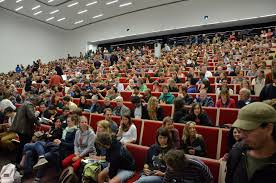Commons are products and resources that are created, cared for and used in a shared way in a great variety of forms. The term has increasingly come into use again over the past decades – “again“ because commons as concept and praxis are ancient and exist worldwide. Today, the research on the shared use of natural resources is mainly connected to the name Elinor Ostrom who received the Nobel Prize for economics for her research in 2009. Ostrom collected best practice examples: self-chosen regulations and locally adapted conflict resolution strategies were some of the design principles of the long-lasting self-governed institutions she described. Differing from Ostrom other authors assume that the main shared features should be looked for in the actual social arrangement, the commoning, rather than in the institutions and regulations.
The spread of knowledge-centred digital commons (such as Wikipedia) and the development of free software (such as GNU/Linux and LibreOffice) played a decisive part in the rising attention paid to the commons in the past years.
Currently, commons can be understood as a concept based on equality and self-governance that is in conflict with the capitalist logic of commodities. Instead of an exchange of goods it relies on voluntary contributions. In them, there is no equivalent to the division of labour into care activities (that is caring for other people and the environment) and the productive activities as well as the division of production and usage processes which are common in capitalism: for example urban commons gardens are usually not about producing food for sale but, next to ecological food production, also about cooking, eating and celebrating together.
We would like to stress that there are no universal blueprints for organising commons together. We assume that the manners and rules in different times and contexts adapt to the needs of the people involved and thus vary. Nevertheless, we can point out common features. Regarding this it is important to clarify that commoning does not just deal with collective property but rather it breaks with the exclusionary logic of property as such. Instead of excluding others by the means of abstract law (property), commons concern the actual physical (and potentially inclusive) discretionary options of possession (actual use). Essential to this is a focus on the needs of those affected by the commoning processes, or those taking part in them.
The commons perspective looks specifically at a type of shared living in which people have a great influence on their own living conditions and choose the activities they pursue mainly according to how much pleasure they give, and how crucial they regard them to be. For the long-term the self-organising commons point of view can be the foundation of a society beyond market economy and state. Core principles are: contribution instead of exchange; actual use instead of property; share all that you can; use all that you need.
While there is no commons umbrella association, there are visible networks such as the Commons Strategies Group and the P2P-Foundation, the Commons-Institute in the German speaking countries and the School of Commoning in Barcelona.
Commoning can be found in any imaginable social context and connected to various resources – such as air, seeds and water but also caring for those in need, digital technology, housing, cooking, art and music, modular bicycle construction and means of production. This is due to the fact that it is not inherent to the nature of a resource whether or not it is a commons. Instead it essentially depends on the way humans deal with them and with each other.
Commoners are people who ”move something”. The only thing we can say for certain about the commons movement from our point of view is: it is a global movement that is internationally connected as well as locally active. But commons are more than “just“ a social movement. On the one hand it is possible that commoners do not explicitly pursue the transformation idea and the critique of capitalism, are not networked accordingly, and neither know nor use the term commons or claim no commons identity for themselves. On the other hand there are commoners who act in a conscious separation from the capitalist commodity and valorisation logic. These we want to call activists and identify them as being the movement. They aspire for a transformation of the world according to commons principles, organise themselves in respective groups and/ or networks and engage politically.
For many activists it is more important to prefiguratively set an example than to demonstrate on the streets. This means that it is a concern for those who make up the commons movement to create spaces in which aspects of utopian aims can be lived through their actions in current decision making processes and interpersonal relationships: “In my own life I practise what I want to see in the greater whole.” The important part is that the social practises of commoning, whose rationale undermines the capitalist logic, are in themselves aimed at changing society.
If degrowth means that we humans have to free ourselves from the bonds of the growth imperative, and if commons activists advocate more commoning in the world, we have to ask ourselves: which growth do we need to free ourselves from? What do we need more of? How could this come about? Who is promoting it? On the level of the actors there seems to exist a high degree of mutual recognition and sympathy. Especially the critical and progressive part of the degrowth movement appears to harmonize with the part of the commons movement that is critical of capitalism. Both aim at breaking with old patterns that are founded in the logic of today’s social system and have effect into (and through) the individual foundations of acting and thinking. Degrowth circles denounce growth imperatives. The commons movement criticises the valorisation pressures in the present society. It is obvious that these are two sides of one and the same coin.
As degrowth was formed as a counter-movement criticizing the growth model, an idea for an alternative of its own was initially not at the centre of attention. Considering commoning however, one can imagine a world in which our living conditions are (re)produced in a non-capitalist way, beyond the growth imperative. Hence commoning is often seen as an integral part in framing a post-growth society. Especially the considerations on Buen Vivir – living well – that are often drawn upon in the context of degrowth show remarkable similarities with the commons concepts and principles.
However we can also determine differences. Degrowth circles focus on resilience and sufficiency. In relation to the ecological boundaries of the planet these are rather implicitly included in commons than vigorously discussed among commoners. From a commons perspective one can argue that parts of the degrowth movement are not critical enough towards the capitalist logics of valorisation, and also depend too much on steering mechanisms of the state. In a way this is a different problem focus as well as a different approach in regard to the choice of a strategy for transformation.
What is missing in the commons perspective and which impulses can it receive from the degrowth movement – and vice versa? One field in which the commons movement can learn from degrowth is concerned with the ecological cycles in a global context. The description and analysis of local and practical knowledge is strong and deeply founded with commoners. Yet, the degrowth academics are relatively stronger in pursuing the research on the planetary boundaries and global ecological cycles. Particularly when looking at the point that activists of the Commons movement consider a commons world a possible reality, an exchange on this point is fruitful and could prevent inappropriate optimism as well as unrealistic scenarios.
In the other direction the degrowth movement could be inspired by the commons perspective. degrowth is often about abstract indicators on CO2-Emissions, economic growth or resource depletion from which the movement derives its critique of consumerism. From a commons perspective, qualitative differences and structural systemic necessities for change come to the fore. The criticism is voiced towards a consumption that does not seek to fulfil needs, but instead aims for status and / or the production of added value; and there is a general assumption that a full and enjoyable life is achievable for everyone. This means that the primary target is not an individual renunciation but, on the premise of a collective self-development of all, to find an answer to: who produces what how and why, and uses it (up).
Against the backdrop of the principle “contribution instead of exchange“ the commons discourse fundamentally criticises the logic of money and exchange. There is a discussion on whether a reform of the monetary systems helps to transgress this logic or rather helps to strengthen it. A long-term commons vision would be a social system that frees itself from exchange as a societal mode of mediation. In addition there is a basic critical attitude towards state institutions – not only because market and state are blamed for playing a substantial role in various enclosures, but also because commons do not work in a centralized way. This is also a significant delineation of the commons movement against a Marxist state centred communism. Locating commons beyond market and state infers that commons activists want to break with the principles of the market economy as well as the nation state. It can be said that their normative foundation is a fundamental rejection of any form of domination. A greater consideration of such discourses that critically debate state and market as socially determining institutions could enrich the degrowth movement and contribute to shed light on structural obstacles to a post-growth society.
A fundamental critique of technology, which is present in the degrowth context and takes its lead from authors like Ivan Illich, is used constructively within contemporary commons circles by asking: which form of technology corresponds to human needs, and who benefits from technology to what end? Among others, the strong roots in the digital world and a great participation of tech-savvy people from hacker- and maker-spaces as well as the Open Hardware circles form the basis for certain optimism towards technology. Critique of technology and optimism go hand in hand: while the one deals with criticising current-day technologies that are seen as problematic, others develop new ones that work according to different principles like modularity, repairability or resource conservation – principles that are also compatible with degrowth demands. For example the project Open Source Ecology has taken it upon itself to develop fifty industrial machines that a small village needs for its inhabitants to lead a sustainable, yet relatively self-sufficient good life.
As mentioned in the beginning, there seems to be a lot of degrowth in commons, and a lot of commons in degrowth. Similarly, other currents that are united in this project find themselves sharing a lot with the two movements. Many of the inspirations are discussed and put to practise in commons contexts. Perspectives that aim for equality of humans and nature as they are found in environmentalist and animal-welfare circles as well as various justice discourses play a role; so does the aim of human equality as demanded by No-Border groups who aspire for a world without national borders.
A transformation perspective that anticipates the path to a commons society is described as a “seed form” approach. This term offers an important reference point, especially in the German-speaking countries. More simply put: it is the idea that a consistent practise of commons can spread in the here and now while it could, simply due to the current crisis prone societal system, be able to become the logic that determines society in the future. Hence the potential of a commons society is already a seed within the current commoning that is not yet fully developed. At the same time, commons projects are always in danger of being usurped. Fights to defend, re-establish and negotiate commonly managed resources are necessary as long as the hierarchical nation state and the capitalist market with their respective logics are dominant. These struggles will be more successful if they take place in the context of a strong, shared and most of all emancipatory movement.
One viable post-capitalist vision is that of a world that is not hierarchical but self-organised like a network of functionally differentiated connection nodes; a world in which everyone’s needs can be met through commons. This world would also be marked by autonomous and responsible activities that give joy and meaning without over-using resources or destroying eco-systems. The commons movement puts its trust in the human potential and translates the concept of sustainability into the language of human needs: there is a need to preserve the planet that can only be met if we organise our individual and collective satisfaction of needs in accordance with the boundaries of the planet. commoning is a practical way to deal with human and non-human nature that is not built on an abstract growth compulsion but acknowledges that we humans are a (re)productive element of the earth.
Commons may not solve all of the world’s problems in the long run, but we live in the final stages of capitalism in which opposites tend to become stronger and conflicts are fought out ever more brutally. Therefore it is of particular importance to create positive perspectives, formulate and – above all – practise a vision of solidarity. For the future we think it is desirable from a perspective of the movement that we find a coordinated direction. Summed under the term convergence, such processes of building alliances are already taking place. At the same time the content disputes should be intensified in order to also discuss strategic questions openly and controversially. The term ‘socio-ecological transformation’, understood as emancipatory and transgressing capitalism, could offer a shared umbrella. Despite it already starting to be “over-used” it can still capture the shared target horizon of the different currents. ---------------------------
This article is a shortened version of the piece on artivism and degrowth in our Degrowth in Movement(s) project. Read the full article here!

In 2008, a few years after the birth of "décroissance" in France, we organized the first International Degrowth Conference for Ecological Sustainability and Social Equity in Paris. Only ten years later, in 2018, we promoted three large international events in the same year: the 6th International Degrowth Conference in Malmö - following Barcelona, Venice, Leipzig and Budapest – as well as a macr...

By Niko Paech The legend of green growth depends on three basic principles: (1) Increase of resource-efficiency, (2) closed material flow cycles and (3) renewable energies. However, despite a host of innovations in the field of climate protection, the ecological damages in the area of energy have been and still are on the rise. The process of ecological modernization reveals itself as a histo...

By Ulrich Brand “Business as usual” is the motto of ruling politics nowadays. The dominant public discussions and policies are staged as necessities and unavoidable adaptions to an austerity policy which is apparently without alternatives. We are assured that rising poverty-rates, the redistribution of wealth from bottom to top and the cutback of social rights and democracy are only te...